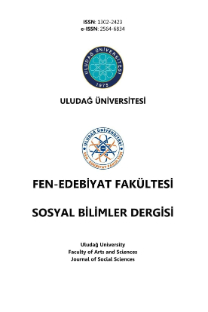Nietzsche'de "Güç Sistemi" ve hakikat ilişkisi üzerine bir inceleme
An inquiry on relation between "the Will to Power" and truth in Nietzsche
___
- ANSELL-PEARSON, K. (1998) Kusursuz Nihilist, (Çev. Cem Soydemir), İstanbul: Ayrıntı Yayınları.
- CLARK, M. (2001) “The Development of Nietzsche’s Later Position on Truth”, Nietzsche, (Ed. John Richardson and Brian Leiter), ss. 59-84, Oxford: Oxford University Press.
- GEMES, K. (2001) “Nietzsche’s Critique of Truth”, Nietzsche, (Ed. John Richardson and Brian Leiter), ss. 40-58, Oxford: Oxford University Press.
- KUÇURADİ, İ. (1995) Nietzsche ve İnsan, TFK Yayınları, Ankara:. NIETZSCHE, F. (1966) Beyond Good and Evil, (Trans.: Walter Kaufman), New York: Vintage Books.
- NIETZSCHE, F. (1968) The Will to Power, (Trans. Walter Kaufman and R. J. Hollingdale), New York: Vintage Books.
- NIETZSCHE, F. (1995) Deccal, (Çev. Oruç Aruoba), İstanbul: Hil Yayın.
- NIETZSCHE, F. (1997) Tan Kızıllığı, (Çev. Hüseyin Salihoğlu-Ümit Özdağ), Ankara: İmge Yayınevi.
- NIETZSCHE, F. (2000) Putların Alacakaranlığı, (Çev. Hüseyin Kaytan), İstanbul: Tümzamanlar Yayıncılık.
- NIETZSCHE, F. (2001), Ahlakın Soykütüğü Üstüne, (Çev. Ahmet İnam), İstanbul: Yorum Yayınevi.
- NIETZSCHE, F. (2003a) Şen Bilim, (Çev.: Levent Özşar), Bursa: Asa Kitabevi.
- NIETZSCHE, F. (2003b) İnsanca Pek İnsanca 1, (Çev. Mustafa Tüzel), İstanbul: İthaki Yayınları.
- NIETZSCHE, F. (2005) Gesammelte Werke, Bindlach: Gondorm Verlag GmbH.
- NIETZSCHE, F. Der Wille zur Macht, Voltmedia GmbH, Paderorn (Tarihsiz).
- POELLNER, P. (2001) “Perspectival Truth”, Nietzsche, (Ed.John Richardson and Brian Leiter), ss. 85-117, Oxford: Oxford University Press.
- ISSN: 1302-2423
- Yayın Aralığı: 2
- Başlangıç: 1999
- Yayıncı: Bursa Uludağ Üniversitesi
Türk tarih tezi ile Türk Dil tezinin kavşağında güneş-dil teorisi
Anonim bir Tarih-i Al-i Osman nüshasının sözvarlığında kalıp yapılar ve arkaik kelimeler
MUSTAFA ULUOCAK, ŞÜKRÜ BAŞTÜRK
Effects of traditional culture on modern Turkish poetry
Nietzsche'de "Güç Sistemi" ve hakikat ilişkisi üzerine bir inceleme
Examining coffe and coffe houses in the divan poetry
Osmanlılar döneminde Bursa'da yaptırılan hastaneler
Federal bölgelere göre Rusya'nın nüfus ve etnocoğrafya özellikleri
